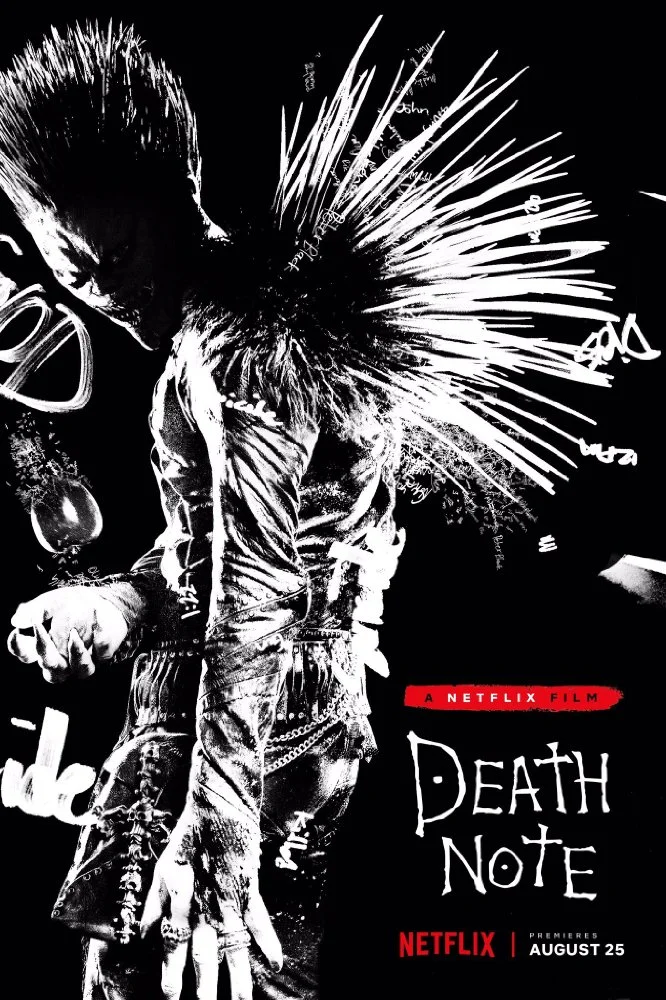Final Death Notation - Death Note (REVIEW)
written by Justin Prince (@prince_justin)
Netflix's Death Note has been divisive from day one, from the original casting of Nat Wolff as Light Turner to the trailers leading up to the release. The reaction isn't without merit, in recent years especially, the controversy of white-washing characters originally portrayed as non-white has built up to a fever pitch. Personally, I stated that I don't see the Netflix Death Note as an example of white-washing, but I won't be getting into that since I already wrote a piece touching on the subject... instead this is the review, SPOILER ALERT: it's gonna be an ugly one.
There's a lot going on in the 90 minute film, but much of my criticism of it can be summed up in the film's first death. Barely the time spent to finish a single episode of anime, Light gets the Death Note and upon Ryuk's urging... something that feels less true to the original and more like a cheesy villain in an anti-drug Saturday morning cartoon PSA... Light has him decapitated after a series of Final Destination-like happen-chances which start with a lady's grocery bag tearing open and culminating in a maintenance van abruptly stopping and sending the ladder right into the guys face... lopping his head clean off in gory fashion.
This first death held no weight and was unnecessarily gruesome... something that sums up Death Note quite well, a weightless picture that dials the gore up to unnecessary levels.
Death Note is an adaptation of the manga of the same name, as a fan of the original I had high hopes that this could at least be an adequate adaption. Aside from the inclusion of a notebook that kills by writing a person's name in it, a Light and L, and Ryuk... there really isn't much that connects this to the original. I get the need to iterate when adapting something, but when adaption forces the film to lose the essence of what made the source material what it is... that's unforgivable.
Light Turner exhibiting that teen angst
Netflix's take on the cat-and-mouse thriller trades in much of the original manga's smartly written dialog and edge of your seat intrigue for a healthy dose of violence sprinkled with the trappings of a B-grade horror flick and an insufferable teen movie. The film's comedic cues were purely accidental with Nat Wolff's portrayal sitting at the uncomfortable place between doom-and-brood and whiny teen angst.
Light Turner and Light Yagami couldn't be further from each other in how the characters are played out in their respective stories. This is something I plan to touch on further in another piece, but what made Light Yagami work as the protagonist in the source material was despite how you the reader knew he was doing some pretty evil shit... you still wanted to root for him. I remember when I read the original manga, I was rooting for Light to win in the end... feeling genuinely let down when (MANGA SPOILER ALERT) Ryuk wrote his name down in the manga's final chapter. As far as Light Turner is involved, I found myself rooting for L the entire time. I wanted Light Turner to lose this game of cat-and-mouse so at least this whole debacle can freaking end.
"shall we begin?"
Light exhibits a strong sense of justice, while this is present it is never expanded upon much. The death of Light's mother and her killer never paying for his crimes does barely touch on his sense of justice, but that one moment alone doesn't explain why Light has such strong aspirations to cleanse the world of evil. This lack of motivation is extended further to much of the cast. Mia Sutton (Margaret Qualley), Light's girlfriend and Death Note using accomplice, plays a huge part in the overarching story... yet the whole time I felt she was undeserving of such a key role. While Mia is intended to be a (very loose) adaption of the Misa Amane character, Mia strays so far from the source that one could argue that she was a character made exclusively for this film. Misa Amane's obsession with Kira... and eventually Light Yagami... stems from when Kira passed judgment on the murderer who killed Misa's parents, Mia lacks any sort of a character development and feels so shoehorned in that she ended up being more of a distraction than a contributing member of the story.
Both L (Lakeith Stanfield) and Ryuk (Willem Dafoe) played their roles well but were wasted on such a weak script and paper-thin character development. At one point near the end of the film, L goes full on ballistic... chasing after Light with a gun in hand rather than trying to beat him with his own intelligence. Ryuk felt the most true to the original among the entire cast, but his few scenes left me wanting and the decision to give Mia Sutton a larger role than Ryuk is a crime to the spirit of the original.
Despite all the negative I've had to share so far, what Netflix's Death Note does do well is cinematography. The use of colors to set the mood of a scene is superb, I have to give many kudos to the people responsible for shooting these scenes, I just wish it was more than just a pretty picture.
Mia Sutton... the edgy bored cheerleader
Where Netflix's Death Note fails the most is in how it completely disregards what made the source material such a seminal piece of fiction. In its original form, Death Note is a game of wits between Light and L. The notebook is saddled with so many rules that much of the fun of the original was how Light used these rules to his advantage, testing them while exploiting them to serve his ends. Next to none of that is present in Netflix's Death Note, Light Turner seems to bumble his way past his roadblocks and even the manga's most exciting bit of catch-me-if-you-can action... the way Light dealt with the FBI agents... was bastardized into a cheap flashback devoid of what made that original scene so powerful.
Even worse, I can count one single instance of someone dying of a heart attack. The original's use of a heart attack as the default death is so ingrained in the story that it's a freaking travesty they didn't include it. In fact, in one instance where Light tells Ryuk that his target's death will be “dealer's choice” the target dies from a barrage of bullets rather than the heart attack. Much of the rules were changed as well, one such rule that completely ruined it for me was the rule that if you burn the page with your target's name on it withing 48 hours after writing it down and indicating the maximum number of days to control said target until death... the whole death part is nullified. This completely removed any sense of weight to Light's decisions, just the option to be able to back out from it is such an afront to the source material I shake my head when trying to figure out what they were thinking.
L tests Kira's resolve
It feels like they took the plot point of a killer notebook, received the most basic of facts from the source, then decided to bastardize the whole damn thing.
Netflix's Death Note severely misunderstands what made the original so compelling. Opting for a story that moves at a break-neck speed... feeling more like they tried to adapt 12 episodes of TV into a 90 minute film. The ending was just as bad as the whole thing and the only positive bit was now it was over. This was Death Note in name only... more like a cheap horror-thriller than a crime-thriller with a supernatural element. We get zero finality at the end, no real resolution... instead they opt for a “you decide what you think happened” sort of ending when it cuts to credits after Ryuk says “humans are so interesting.” I just wish that this damn movie was even a little interesting...
D-
Style is all it had going for it in this paint by numbers adaption















